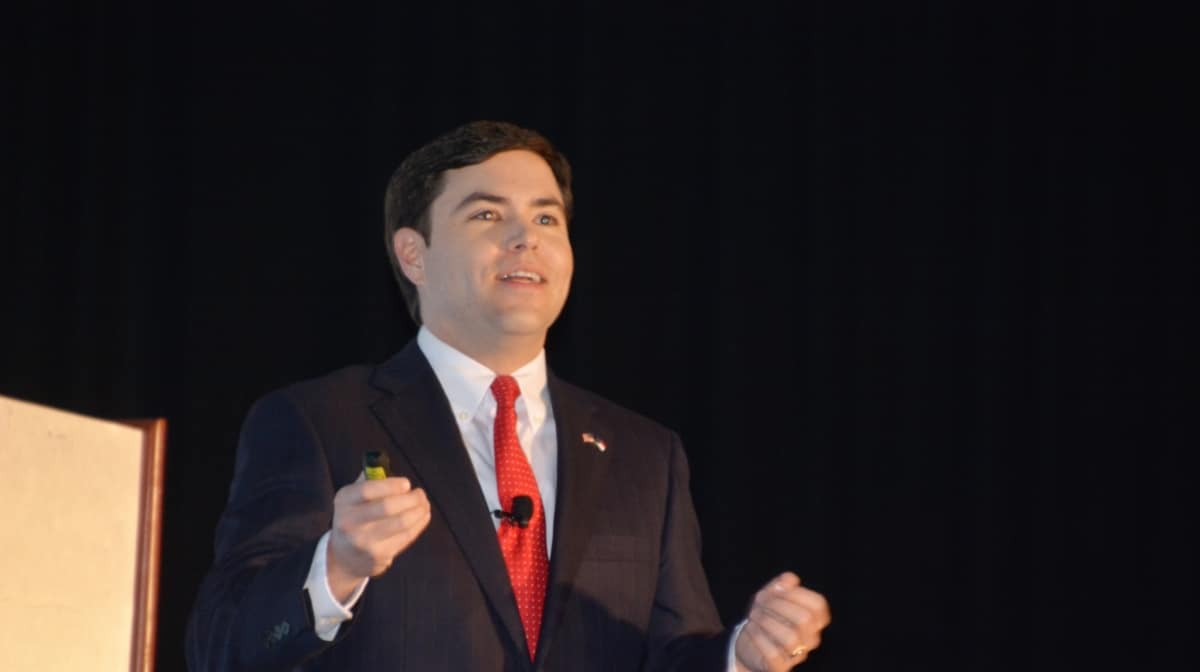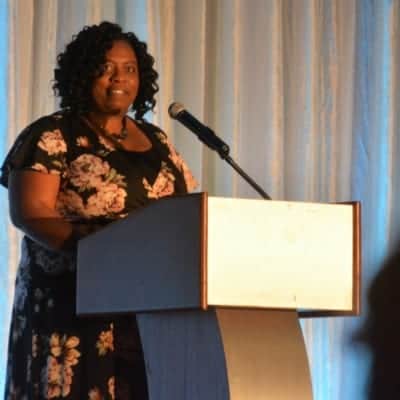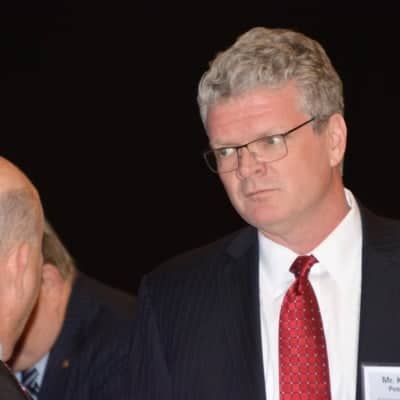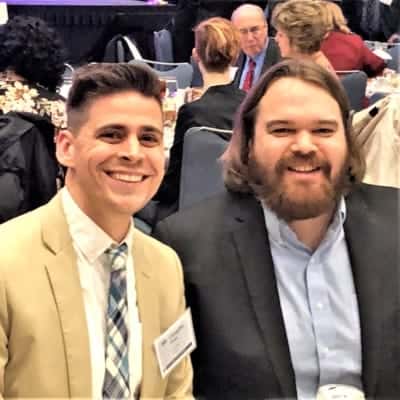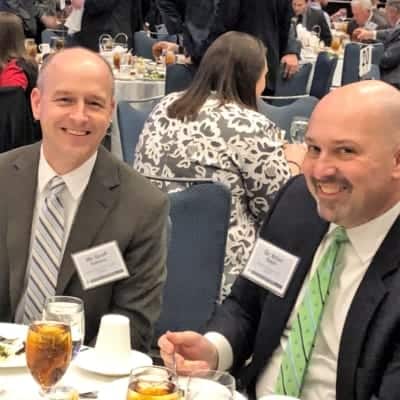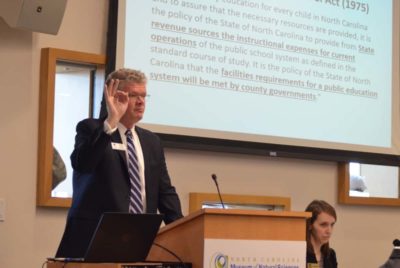State Superintendent Mark Johnson announced at his Innovation and Leadership Dinner last night his plan to make the state’s public schools the best for students and teachers by 2030. The event, made possible with funding by The Wallace Foundation, focused on Johnson’s “#NC2030” plan, which includes the intent to eliminate high-stakes tests, increase teacher compensation, recruit the best teachers to the profession, and more.
“By the year 2030, North Carolina can be the best place to learn and the best place to teach,” Johnson said. “This is a goal that can unify us.”
Here is a livestream of the event so you can watch:
Johnson laid out four metrics he said will make the plan successful, including getting 4-year-olds in high-quality kindergarten readiness programs, getting fourth graders on reading level, making sure when students graduate they are on track for a good career, and recruiting and keeping education professionals in the state. He said that each year for the next decade, North Carolina should be progressing in these four areas.
“Even if we start doing everything right tomorrow, it’s still going to take us time,” he said. “But we have the most important component already.”
That “important component” is the state’s teachers, he said.
The details of how Johnson intends to reach the #NC2030 are in Johnson’s legislative agenda, which he also released last night.
Best place to begin
Help all children enter kindergarten ready to learn
- Expand high-quality preschool opportunities for 4-year-olds, streamline funding and access, and require NC DPI to approve a program’s academic alignment with kindergarten expectations. Offer additional kindergarten-readiness tools for children on the waitlist for NC Pre-K and pilot kindergarten-readiness camps.
Continue to focus on early literacy
- Improve Read to Achieve implementation through state-led efforts focused on professional development, high-quality curriculum, on-the-ground support for evidence-based reading instruction through coaching and data-driven feedback, and enhanced summer literacy instruction.
- Continue and expand partnerships such as Wolfpack WORKS that provide intensive support, mentoring, and professional development to reading teachers.
- Review assessments and determine appropriate levels to ensure that students are prepared for fourth grade.
Best place to learn and pursue career pathways
Implement personalized, low-stress education settings that maintain high standards
- Implement personalized-learning opportunities to improve student proficiency, reduce burdens on teachers, and eliminate high-stress over-testing.
- Allow a working group of districts to opt out of the N.C. Mathematics Standard Course of Study through a pilot study using clear, rigorous, and results-driven math standards and personalized-learning tools.
Encourage connections to successful career pathways
- Expose and prepare students for careers in skilled trades, military, and other high-demand career fields through the SkillsUSA Career Essentials program, improved distance-learning experiences, and access to more community college career coaches. Ensure all students graduate financially literate.
- Prepare middle and high school students for high-tech careers by expanding computer science courses and continuing coding and robotics grants.
Ensure safe, supportive environments for all students, families, and educators
- Continue and expand school-safety and mental-health professionals and equipment grants and encourage innovative approaches, partnerships, and training. Provide state-level regional support to districts. Fund the ongoing costs of an anonymous tip application.
- Provide additional resources and support to meet the unique needs of military families and districts with high demands for special-education services. Allow districts the flexibility to align their calendars to meet community needs and partnerships.
- Continue to provide innovative school choices to families to best meet their needs while holding innovative options accountable for results.
Facilitate appropriate learning spaces for students and educators
- Continue lottery funding to assist lower-wealth counties with their critical public school building capital needs. Adopt a plan to address the capital needs of public schools across the state, including agency resources to review and oversee the projects.
Best place to teach
Secure competitive compensation and benefits for educators
- Provide all teachers with a salary increase of at least 5 percent, which would keep the NC average teacher salary competitive with, and greater than, the median household income in North Carolina. A 7 percent increase for all teachers would further promote the competitiveness of teacher salary in N.C.
- Create professional teaching cohorts for the entire state by adding time and compensation at the beginning of the school year for all first-through fourth-year teachers for professional and cohort development. Opt-in program for experienced, qualified teachers to serve as Teacher Leaders during that time (with additional compensation) and throughout the year. Scale the Advanced Teaching Roles pilot to meet demand.
- Recruit and retain teachers through a multi-faceted teacher recruitment and appreciation campaign and expand the NC Teaching Fellows Program.
- Raise principal pay to compete with surrounding states; reward principals for taking on complex schools.
Provide 21st century tools and support for educators
- Increase funding for textbooks and digital media, empower teachers with direct control over the use of state funding for classroom supplies, and provide all schools with consistent, cost-effective access to high-quality digital and personalized-learning tools.
- Continue the current 15-point grading scale to support consistent evaluation of performance and growth (as opposed to switching to a 10-point scale). Allow a waiver for class size by the state superintendent in case a local district has sufficiently demonstrated they are unable to find qualified teachers to meet requirements.
- Support and enable policymakers, local districts, and educators to make data-driven decisions to improve student outcomes through modern systems and state-level data analytics personnel and resources.
Announcing #NC2030: The Best Place To Learn and Teach
Johnson said the #NC2030 plan is the result of traveling the state for the past couple of years on his listening tour and soliciting feedback from people in different communities.
As he traveled, he said he asked many people the same question:
What is North Carolina’s goal for the K-12 public school system?
“I ask this of many, many different people, and if nothing pops in your head, that’s ok, because I get a lot of blank stares,” he said.
Some people do answer. He said he’s heard a 90 percent graduation rate, no low-performing schools, or even a sound, basic education for every student as goals we should be achieving.
He said those are all good goals, but they raise questions. What about the 10 percent who aren’t graduating or the low achievers languishing in high-achieving schools? And what is a sound basic education?
That last phrase comes from the landmark Leandro ruling that found that the state is responsible to provide the opportunity for a sound basic education to every student, but Johnson said the meaning of that phrase is still elusive.
“We’ve been arguing that for decades, and we still have many commissions and every branch of government trying to figure out what that means,” he said.
Johnson touched more specifically on a few topics during his presentation, including the need to shift the focus of Read to Achieve from assessments to showing instructors how to teach reading.
He displayed the statistic that 39 percent of North Carolina first graders were able to read proficiently in 2017, which he said was inadequate. He went on to talk about the weaknesses of Read to Achieve — a recent report on the initiative showed that it was failing to achieve meaningful gains in reading for students.
Johnson said that when DPI went out to help districts implement Read to Achieve, the training focused on assessments. He said DPI is now shifting focus to emphasis instruction on how to teach reading.
Johnson also talked about the importance of personalized learning and helping teachers utilize digital technology effectively.
He said one of the best tools for the 21st century are the devices in everybody’s pockets. The devices that people use every day to personalize the content they consume and the things that they do. But while that freedom is afforded everybody, we still have an education system that hearkens back to a long-ago time. He said we have teachers in a box.
“What is that box?” he asked. “That box is our education system designed 100 years ago.”
Personalized learning
Johnson invited up Kisha Clemons, principal of Shuford Elementary in Newton-Conover City Schools, to talk about how her school has used personalized learning to turn its school around.
“We believe that the greatness exists in each and every one of us,” she said, adding later: “What you will see in our vision is our commitment to excellence.”
Transforming systems
Kelly King, the chairman and CEO of the BB&T Corporation, gave the keynote address at the event, highlighting how much the economy has changed and how education needs to transform to meet the needs of today’s businesses.
There was a time when high school graduates could make good lives for themselves doing manual labor, but he said those jobs are gone, replaced by more sophisticated work that requires more education. And now, he said there are fewer people able to do the newer jobs of our economy.
“This incredible economic gap is developing that is ultimately going to destroy our community, destroy our country, if we don’t do something about it,” he said.
He said that the state can change, but that, at the moment, there are too many young people who don’t see a way forward and don’t have hope for the future. He called on the audience of educators, policymakers, and others, to do what’s necessary to improve the outlook for today’s students.
“Let’s make sure that these young people in North Carolina have hope,” he said.
Principal preparation and advanced teaching roles
Johnson also briefly talked about principal preparation as well as recruiting and retaining the best teachers for North Carolina through advanced teaching roles — both items touched on in his legislative agenda.
On the issue of attracting teachers to the state and retaining them, Johnson said it’s important to note the gains North Carolina has made.
“We have to acknowledge how far we’ve come with teacher pay in the last few years, and we need to talk about where we need to go,” he said.
He noted that when you look at comparably high salaries in other states, they are often in line with those states’ median income. He said the same is true for North Carolina. He said this year, the average teacher salary should be more than $53,000, almost $54,000, while the median income in the state is about $50,000.
“You can see that the investments are starting to pay off,” he said.
Part of Johnson’s legislative agenda includes at least a 5 percent raise for teachers.
In addition, Johnson announced two initiatives which he said will help achieve his goals — the North Carolina Leadership Dashboard and “Teach NC.”
The Dashboard is an online tool that will allow school leaders to use “real-time data” strategically. It’s being built with money from The Wallace Foundation and will launch for the 2019-20 school year.
“Teach NC” is a collaboration between the Department of Public Instruction, Best NC, and Teach.org. Launching this spring, according to the press release, it is “a public-private teacher appreciation campaign to better align the image of the teaching profession with the fruitful, fulfilling career it is and develop a statewide teacher-recruitment system to attract the next generation of NC teachers.”
